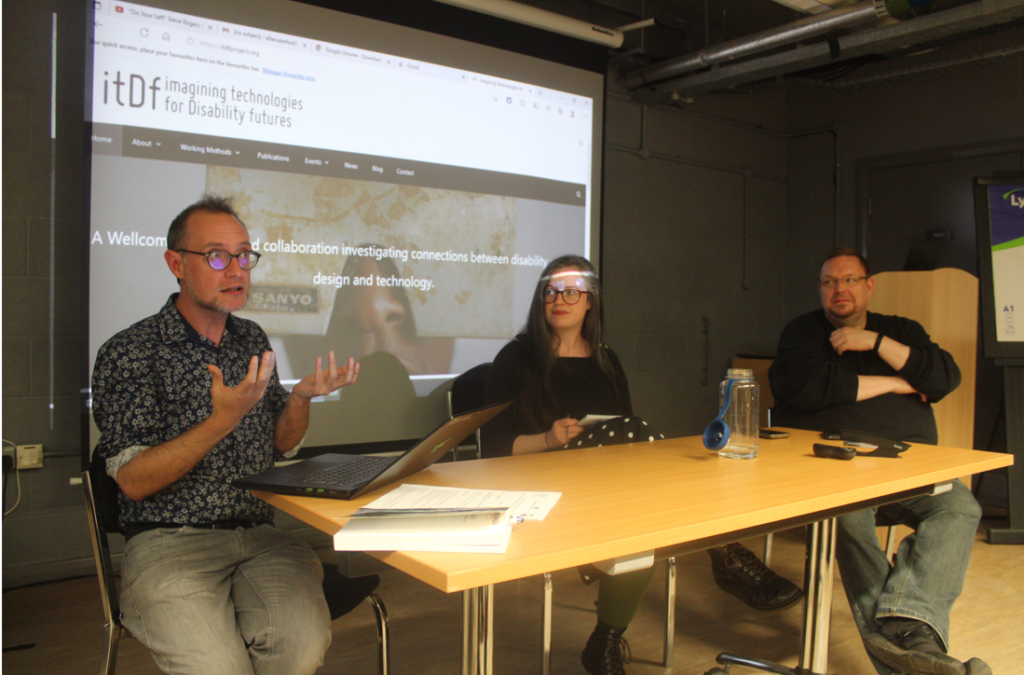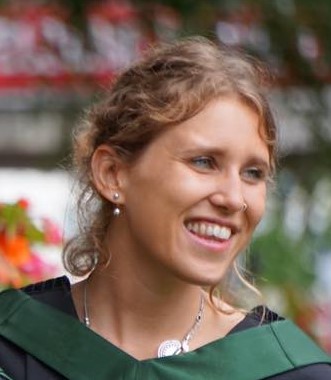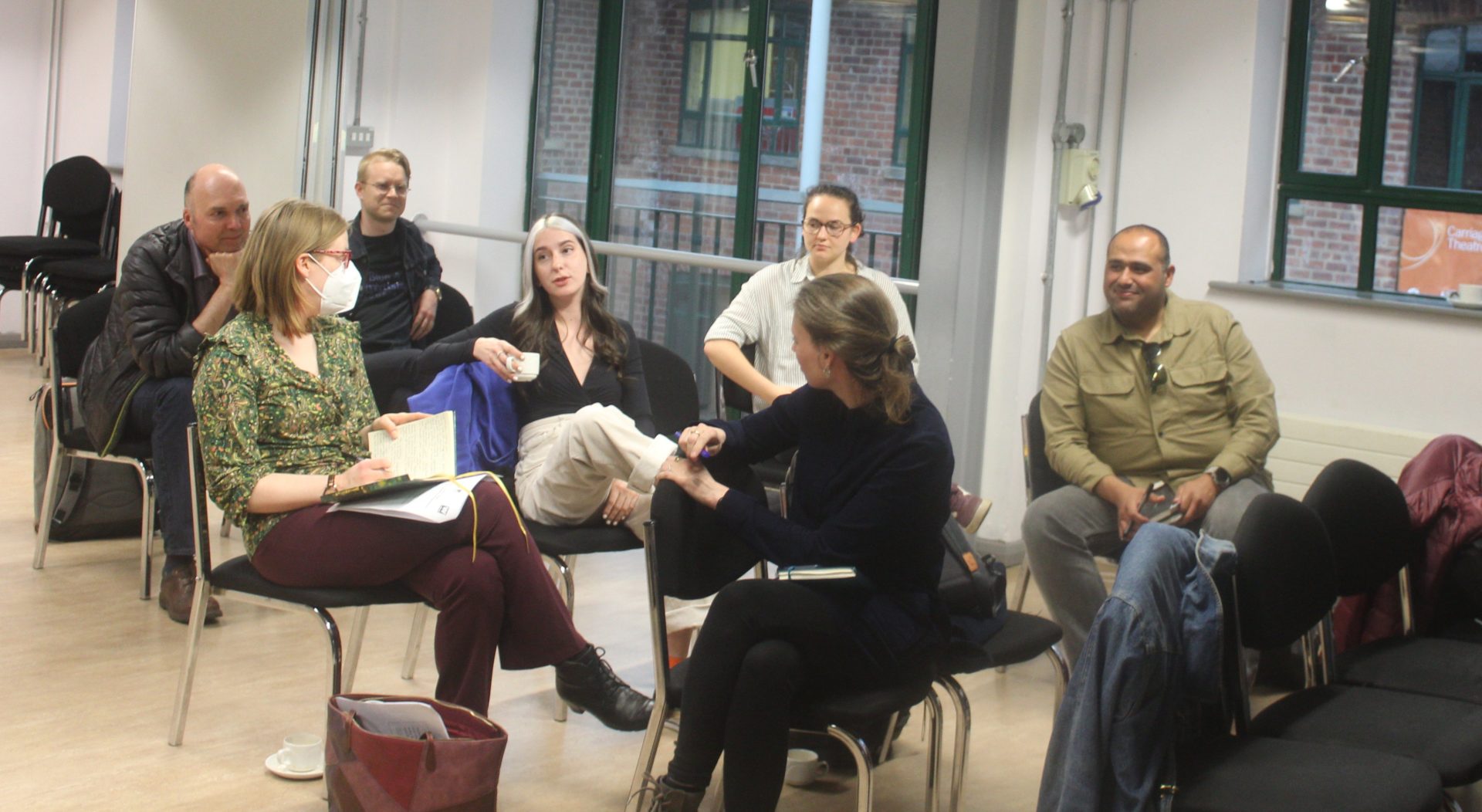On Friday May 6, the Leeds itDf team for Work Package 1 (‘Imagining/Experiencing Disability, Care and Embodiment’) held a one-day symposium exploring ‘Everyday embodiment and technology in speculative and science fiction’. Organisers Stuart Murray (project PI), Amelia DeFalco (co-investigator), Ellie Wakeford (PhD researcher), and Anna McFarlane (recently appointed Lecturer in Medical Humanities at the University of Leeds) were joined at the Carriageworks Theatre in Leeds by an intimate group of researchers, designers and creative practitioners, including itDf team members Raymond Holt, Mohammad Shaqura, and Katie Brown.
The day began with a shared keynote from Gavin Miller (University of Glasgow) and McFarlane who explored two different embodied conceptions of the future; one where it will make us physically sick and the other as a potential escape to ‘wellness’ from a toxic and disabling present. Drawing on Alvin Toffler and Adelaide Farrell’s Future Shock (1970), Miller investigated the idea of the future as a medical problem, where its unfamiliarity and strangeness causes a stress reaction – literally a form of ‘culture shock in one’s own society. Toffler’s notion of the future as an unknown, fixed entity, ready to attack (‘the future is coming: deal with it!’) was countered by McFarlane who, using a range of disability scholarship, argued for the power of imagining to create future change. Despite the acknowledged utopian bent in her presentation, however, she ended on a note of ambivalence, questioning the (potentially problematic) place of academia to intervene in cultural productions of the future.
The idea of collective creation continued into the next panel with Yugin Teo’s (Bournemouth University) exploration of productive interactions, collective memory production and mutual recognition between humans and companion robots in Big Hero 6 (2014), Robot and Frank (2014), and Marjorie Prime (2014). This was followed by Ria Cheyne’s (Liverpool Hope University) look into the marvellous and mundane medical technologies depicted in little-known author John Varley’s fiction Tango Charlie and Foxtrot Romeo (1986). Varley’s work, Cheyne argued, challenges what Jo Gosling terms the Scientific Model of Disability and the belief that science will ‘eliminate abnormality’ in the future. The panel ended with Lars Schmeink (visiting Leverhulme Professor at the University of Leeds) discussing bodily augmentation in the video game Deus Ex: Human Revolution (2011) in which characters’ options in choosing prosthetics become part of a return to capitalist prerogatives of productivity and economic growth.
The second panel investigated the notion of science fiction as a practice for more communal futures. Joining us virtually, Florence Okoye from AfroFutures_UK looked at how afrofuturism can be used a tool for thinking through the logic of universal design, while Jo Lindsey Walton read from a science fiction work-in-progress that depicts a brief moment of connection in a world of intensive data extraction, digital distraction, and algorithmic production.
In the final panel of the day, Diletta De Cristofaro (Politecnico di Milano/Northumbria University) and James Rakoczi (University of Durham) explored how technology impacts cultural concerns around sleep and anxiety. Drawing on contemporary science fiction narratives such as Karen Russell’s Sleep Donation (2019), Cristofaro looked at the notion of technology as both cause and cure and the ways in which it can turn sleep into a tangible commodity for trade and exploitation. Rakoczi, looking at attention anxiety and distraction in Andrey Zvyagintsev’s 2017 film Loveless, noted that attention is also conceived as both scarcity and commodity, with multiple entities vying to ‘capture restless attention’. Using Walter Benjamin’s theory of distraction, however, Rakoczi suggested that instead of being in crisis, anxiety can in fact provide potentially hopeful and productive ways of conceiving futures.
The day ended with an informal roundtable. Chair Murray was joined by McFarlane, Schmeink, and Walton to discuss a range of topics, from various working models of disability, to a return to the idea of ‘future shock’ to explore ways in which both present and future bodies are framed by science fiction imaginaries.

On May 17, a follow-up event was held online, providing an opportunity for those unable to attend in-person to discuss the day and connect with the speakers. itDf team members Murray, DeFalco, Wakeford and Holt were joined by McFarlane, Teo, and Cheyne, who summarised their talks, while slides and papers from the other presentations were provided online.
All who participated felt the event was a really positive experience, providing a space for continuing conversation and new reflections for attendees at a more informal and leisurely pace. As a practice, it is something we plan to continue to explore and develop in planning future itDf hybrid events.
About the author

Ellie Wakeford
@elliewakeford2
Ellie is a PhD student at the University of Leeds involved in the ‘Imagining/Experiencing Disability, Care and Embodiment’ work package, focusing on embodiment and disability in speculative and science fiction.
Her work is concerned with investigating the boundaries of the body, its entanglements with organic and inorganic matter, and the impact this has on our ideas of personhood and what it means to be ‘human’. Ellie’s project continues these investigations into the materiality of embodied existence, focusing on the impact of surveillance technologies and big data practices on embodied experience and concepts of self, agency, and autonomy.

